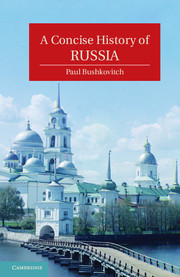Book contents
- Frontmatter
- Contents
- List of Figures
- Abbreviations
- Acknowledgments
- Prologue
- 1 Russia before Russia
- 2 Moscow, Novgorod, Lithuania, and the Mongols
- 3 The Emergence of Russia
- 4 Consolidation and Revolt
- 5 Peter the Great
- 6 Two Empresses
- 7 Catherine the Great
- 8 Russia in the Age of Revolution
- 9 The Pinnacle of Autocracy
- 10 Culture and Autocracy
- 11 The Era of the Great Reforms
- 12 From Serfdom to Nascent Capitalism
- 13 The Golden Age of Russian Culture
- 14 Russia as an Empire
- 15 Autocracy in Decline
- 16 War and Revolution
- 17 Compromise and Preparation
- 18 Revolutions in Russian Culture
- 19 Building Utopia
- 20 War
- 21 Growth, Consolidation, and Stagnation
- 22 Soviet Culture
- 23 The Cold War
- Epilogue
- Further Reading
- Index
15 - Autocracy in Decline
Published online by Cambridge University Press: 05 June 2012
- Frontmatter
- Contents
- List of Figures
- Abbreviations
- Acknowledgments
- Prologue
- 1 Russia before Russia
- 2 Moscow, Novgorod, Lithuania, and the Mongols
- 3 The Emergence of Russia
- 4 Consolidation and Revolt
- 5 Peter the Great
- 6 Two Empresses
- 7 Catherine the Great
- 8 Russia in the Age of Revolution
- 9 The Pinnacle of Autocracy
- 10 Culture and Autocracy
- 11 The Era of the Great Reforms
- 12 From Serfdom to Nascent Capitalism
- 13 The Golden Age of Russian Culture
- 14 Russia as an Empire
- 15 Autocracy in Decline
- 16 War and Revolution
- 17 Compromise and Preparation
- 18 Revolutions in Russian Culture
- 19 Building Utopia
- 20 War
- 21 Growth, Consolidation, and Stagnation
- 22 Soviet Culture
- 23 The Cold War
- Epilogue
- Further Reading
- Index
Summary
The quarter of a century from the assassination of Alexander II until the 1905 Revolution was one of political stagnation. The response of the new government to the assassination was to stop the process of reform, to publicly affirm the necessity of autocracy, and to formulate plans for counter-reforms. The latter came to little, but the government took advantage of every possibility to block criticism, political discussion, and organization among the public. Though it returned to sponsoring economic development in the 1890s under Minister of Finance Sergei Witte, it refused to recognize the implications of the further modernization of society that resulted in part from its own measures. The increasing isolation of the government and its own internal lack of coordination led to the botched attempt at modern imperialism in Manchuria, an attempt resulting in a failed war with Japan that nearly brought down the monarchy.
Alexander III had become the heir to the throne in 1865 on the death of his older brother. Alexander was already twenty at the time and the product of a rather narrow military education unlike that provided for his brother. In 1866 he married Princess Dagmar of Denmark (Mariia Fedorovna after her conversion to Orthodoxy), leading to a stable marriage with a woman of intelligence and extremely conservative views. The young heir was no intellectual, but he did come in contact with Slavophile ideas at court and through his tutor in jurisprudence, Konstantin Pobedonostev. Through the guards and other aristocrats he became friends with the conservative publicist (and the most prominent gay in the St. Petersburg aristocracy), Prince V. M. Meshcherskii. These were highly principled radical conservatives, with nothing but contempt for freedom of speech, democracy, and representative government, all of which they saw as shams and likely to lead to revolution. In their view what was needed was the unity of society and the monarch, which they saw as the essence of autocracy. By the 1870s they formed a powerful opposition to the more liberal ministers around Alexander II, powerful largely because of their association with the heir. As part of his attempt at balanced government, Tsar Alexander II appointed Pobedonostsev head of the Synod, a position he held for the next twenty-four years. After Alexander III came to the throne, Pobedonostsev used his position at the Synod to retain constant access to the tsar, offering him advice on all sorts of subjects well beyond the ecclesiastical issues under his purview. In the eyes of liberal society and many government officials, he had far too much power and influence, all of it in a conservative direction. “Prince of Darkness” was one of his milder nicknames.
- Type
- Chapter
- Information
- A Concise History of Russia , pp. 272 - 292Publisher: Cambridge University PressPrint publication year: 2011

